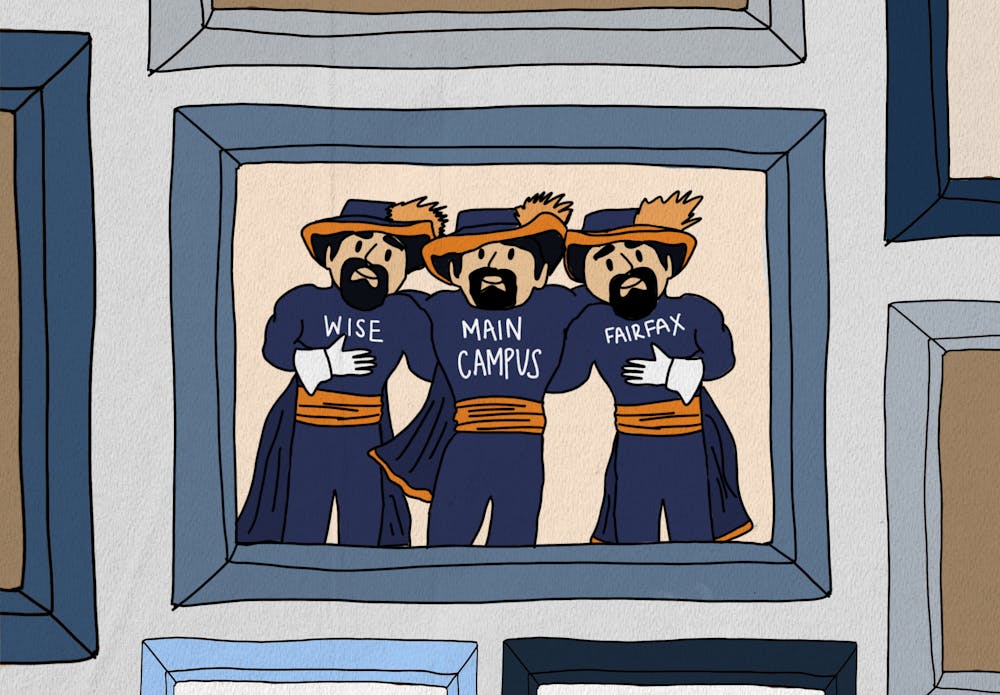The application cycle for the Class of 2029 has now concluded, and the University is more popular than ever — that is, specifically the University’s Main Campus is more in demand than ever. The College at Wise, in contrast, registered a concerning drop in interest. While the Main Campus recorded an 8.5 percent increase in applications overall, the College at Wise saw a distinct and unusual fall of more than 20 percent in the same statistic. It is easy to compare these statistics and have concern about whether they signal a greater fall-off in interest towards the College at Wise. However, much to an economist’s chagrin, a statistic does not tell the full story. Instead, with a longer-term view, it is clear that the College at Wise has held a good track record of growth, and one blip is not cause for concern for the University’s regional campuses.
It has been 71 years since the College at Wise opened as the first public college in Virginia’s western and southwestern regions. It was the first of the University’s increasingly expanding campuses across Virginia. Since then, the College at Wise has grown to have an enrollment of over 2,200 students and an offering of 34 majors, with an emphasis on liberal arts and pre-professional studies as the heart of the institution’s mission. This long-term growth and strengthening of the College at Wise not only provides necessary context for this year’s fall applications but also has been heralded as an example to justify further expansions by the University, most recently the opening of its Fairfax campus earlier this year.
Beyond the number of students or academic programs, the College at Wise is uniquely impressive in its scale of financial support for students — among all public Virginia colleges and universities, College at Wise students who receive financial aid pay the lowest share of the baseline level of tuition. Over 80 percent of students receive some form of financial assistance at the College at Wise. Furthermore, in financial support and programs like Appalachian Studies, much is done to support the local Appalachian community, which by in-large has greater socioeconomic struggles than Virginia as a whole. Both financially and academically, the College at Wise has tangibly demonstrated its commitment to supporting students from a wide breadth of socio-economic backgrounds.
The College at Wise’s infrastructure of financial support exemplifies the broader aims of the University to adequately support its burgeoning student body. In line with its attempts to improve the diversity of its student body, the University as a whole has sought to improve its financial outreach and support to students from economically diverse backgrounds. The aiding policies in place at the College at Wise thus both demonstrate the future importance of the campus as part of the University’s broader aims and also provide an example for how the overarching rhetorical ethos of the University can be executed across campuses.
Beyond specific and tangible initiatives that demonstrate the importance of the College at Wise, the institution also stands as an important symbol for the University’s expansion more broadly. As the title University of Virginia literally implies, the University’s expansion off-Grounds is important in order to help ensure a sufficient provision of education across the entire state of Virginia, whether it be Appalachian communities at the College at Wise or part-time workers in Fairfax. Long-term support for the College at Wise would demonstrate that the University as a whole intends to champion its off-Grounds campuses no matter what short-term headwinds arise. Through continual support for off-Grounds campuses, incoming students and professors alike would maintain trust in the permanence of these institutions. Consequently, they would be more likely to consider them as prospective educational institutions, further alleviating whatever application-related struggles there may currently be.
Despite the significance of the College at Wise epitomized in its impressive financial support and symbolic power for the University overall, there are several facets in which the campus would benefit from greater University support. Focusing solely on the recent acceptance statistics threatens to obscure these true areas of growth. For example, last fall, student lounges were converted into temporary student accommodations due to the lack of sufficient provision for new students. A continual lack of housing might prompt a long-term fall in applications. However, conversely, a continual provision of housing could help to ensure that application statistics improve going forward. Given the College at Wise’s future aims of improved retention rates and increased applications, it is clear that greater support from the University is necessary on matters such as housing.
The College at Wise began with 109 students, primarily Korean War veterans, in an area of Virginia that did not offer sufficient college education. The Fairfax campus has been placed in one of the most ethnically diverse regions in the country. Our University, the University of Virginia, is just that — it is a University of all Virginia and more. This title and value epitomizes the need to take a longer-term view of all University campuses rather than focusing in on one year’s acceptance statistics at the College at Wise. Because by ensuring that incoming students are able to find a home at the College at Wise, we can further ensure that the College at Wise will continue to find a home at the University as a whole.
The Cavalier Daily Editorial Board is composed of the Executive Editor, the Editor-in-Chief, the two Opinion Editors, a Senior Associate and an Opinion Columnist. The board can be reached at eb@cavalierdaily.com.







